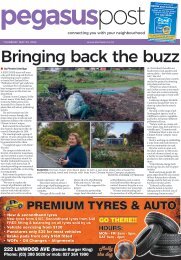Special Publications: June 30, 2022
You also want an ePaper? Increase the reach of your titles
YUMPU automatically turns print PDFs into web optimized ePapers that Google loves.
home & leisure | ?? home & leisure | 77<br />
Christchurch City Council’s Eco Design Advisor Julie<br />
Villard notes that whatever heating system you use to<br />
keep your home cosy, insulation is the fundamental<br />
requirement, and it will also make your heating system<br />
more cost-effective.<br />
Insulation materials on the market include natural<br />
products such as glass and wool and manufactured<br />
products such as polyester and foil.<br />
For those designing and building a new home,<br />
decisions on insulation will be made at this point.<br />
Insulation is most commonly placed in the ceiling and<br />
under the floor; however, as Julie also notes, insulating<br />
the walls as well will provide maximum benefit.<br />
Of course, for existing homes insulation can be<br />
retrofitted to noticeably improve heat retention.<br />
Next, choosing a heating system<br />
Firstly, this will depend on what type of heat you prefer<br />
– convection or radiation. Convection heating, which<br />
heats the air, is provided with a heat pump, convector,<br />
fan heater, pellet fire (fan) or convector-radiator.<br />
Radiation heating, which heats surfaces, is provided<br />
by the sun, a wood burner, radiator, panel heater or<br />
underfloor heating.<br />
The second factor in choosing the best heating system<br />
for your home is how your house retains heat. What is<br />
its thermal mass and is it airtight? Keep in mind new,<br />
permanent material homes function differently from<br />
older, weatherboard structures.<br />
Thirdly, do you want the heating system to operate<br />
with minimal input, or do you prefer to control it?<br />
A dry home stays warmer<br />
“To heat your home easily and keep it<br />
warm and cosy you need to make sure<br />
it’s dry,” Julie advises.<br />
“Dry air is easier to heat, damp air is<br />
hard to heat, because you have to heat<br />
the air, plus the water in the air.”<br />
Dry: relative humidity between 40 per<br />
cent and 60 per cent – not more, not<br />
less. (Measure with an indoor weatherstation<br />
or hygrometer.)<br />
Warm: temperature above 14 degrees<br />
minimum at any time (if your house<br />
is reasonably insulated) – ideally 16<br />
degrees in the bedroom, 20 degrees in<br />
the living spaces.<br />
Good habits to keep your house dry:<br />
• Use the range hood every day, for five minutes, even if you are not<br />
cooking (to create a draft) or leave it on for an extra five minutes on low<br />
after cooking. (Cooking pasta releases five litres of moisture in the air, so<br />
make sure this is removed.)<br />
• Open your bedroom windows for five minutes in the morning, to allow<br />
the moisture you expired during the night to get out, also the CO2, and<br />
let dry, fresh air come in. Five minutes is enough – if a window is open<br />
for longer than that, you will not be ventilating anymore, just losing heat.<br />
• Heat the bathroom with a fan heater before taking a shower. Warm air<br />
will hold more moisture, and then it will be taken out by the<br />
extractor fan.<br />
• Keep the bathroom door closed after your shower to allow the extractor<br />
fan to do its job. Otherwise, the moisture will go into your house, and<br />
condensate on your window the next morning.<br />
• Or install a ventilation system that does all of the above for you.<br />
WALL<br />
INSULATION<br />
WITHOUT<br />
RENOVATION<br />
Something for everyone<br />
Available in all good bookstores and supermarkets, or subscribe and save up to 50% off the rrp<br />
For the motoring<br />
enthusiasts<br />
Find us at the Home &<br />
Leisure Show to book<br />
your free home<br />
assessment.<br />
insulmax.co.nz<br />
027 260 2<strong>30</strong>7<br />
For the<br />
rugby fans<br />
0800 77 77 10 | alliedpressmagazines.co.nz<br />
For the seasonal<br />
gardeners<br />
For the green<br />
thumbs<br />
HRV AirSense <br />
ventilation<br />
has landed at<br />
the HRV stand<br />
HRV AirSense is a New Zealand<br />
home ventilation system that<br />
is scientifically proven to<br />
reduce moisture 1 , and helps<br />
prevent mould.<br />
hrv.co.nz | 0800 478 123<br />
1<br />
Based on a scientific study of 15 New Zealand homes conducted by Unitec<br />
Institute of Technology (Auckland) on behalf of HRV during winter and spring 2021.<br />
Results may vary depending on design and geographic location of a home.<br />
VENTILATION REINVENTED


















